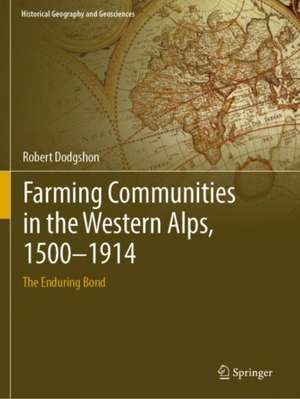Farming Communities in the Western Alps, 1500–1914: The Enduring Bond: Historical Geography and Geosciences
Autor Robert Dodgshonen Limba Engleză Paperback – 15 aug 2020
The book appeals to geographers, historians, environmental scientists and everyone interested in traditional farming communities and their long-term challenges.
| Toate formatele și edițiile | Preț | Express |
|---|---|---|
| Paperback (1) | 791.07 lei 39-44 zile | |
| Springer International Publishing – 15 aug 2020 | 791.07 lei 39-44 zile | |
| Hardback (1) | 808.03 lei 39-44 zile | |
| Springer International Publishing – 10 iun 2019 | 808.03 lei 39-44 zile |
Preț: 791.07 lei
Preț vechi: 1040.88 lei
-24% Nou
Puncte Express: 1187
Preț estimativ în valută:
151.36€ • 158.89$ • 125.64£
151.36€ • 158.89$ • 125.64£
Carte tipărită la comandă
Livrare economică 07-12 aprilie
Preluare comenzi: 021 569.72.76
Specificații
ISBN-13: 9783030163631
ISBN-10: 3030163636
Pagini: 168
Ilustrații: XVII, 168 p. 71 illus., 18 illus. in color.
Dimensiuni: 210 x 279 x 18 mm
Greutate: 0.53 kg
Ediția:1st ed. 2019
Editura: Springer International Publishing
Colecția Springer
Seria Historical Geography and Geosciences
Locul publicării:Cham, Switzerland
ISBN-10: 3030163636
Pagini: 168
Ilustrații: XVII, 168 p. 71 illus., 18 illus. in color.
Dimensiuni: 210 x 279 x 18 mm
Greutate: 0.53 kg
Ediția:1st ed. 2019
Editura: Springer International Publishing
Colecția Springer
Seria Historical Geography and Geosciences
Locul publicării:Cham, Switzerland
Cuprins
Introduction: Traditional Alpine Communities and the Challenge of Long-term Sustainability.- The Landholding Foundations of Alpine Farming.- Face to the Sun: the Exploitation of Arable.- The Ties that Bind: Livestock Farming in the Western Alps 1500-1914.- The Alpine Commons: Resource, Regulation and Exploitation 1500-1914.- The Alpage of the Western Alps.- Coping with Risk 1500-1914.- Epilogue.
Notă biografică
Robert A. Dodgshon is an emeritus professor of Aberystwyth University. He was formerly Gregynog Professor of Geography and Director of the Institute of Geography and Earth Sciences at Aberystwyth. He has written extensively on historical geography. His previous work includes books on geographical change, Europe and on farming communities in the Scottish Highlands and Islands during the medieval and early modern period. He has long had a particular interest in the livelihoods and strategies by which mountain communities generally ensured stability. As well as being a Founding Fellow of the Learned Society of Wales, he is also a Fellow of the British Academy.
Textul de pe ultima copertă
This monograph explores traditional farming communities in French-speaking areas of the western Alps for the period 1500-1914 and how they endured in such an environment despite the many problems and risks which it posed for their subsistence and welfare. Using an extensive amount of archival material drawn from the relevant regional archives, the book presents a great deal of fresh data. Its central theme is how such communities responded to the opportunities and challenges presented by the highly variegated environment of their setting. The view taken is that their strategies of exploitation stressed diversity and flexibility, mapping the highly varied ecologies and resource opportunities of their setting into these strategies by spreading livelihood and risk as widely as possible. This interpretative framework is developed across all the book's themes: landholding, arable and livestock sectors, use of the commons and, finally, how communities coped with climate-based risks.
The book appeals to geographers, historians, environmental scientists and everyone interested in traditional farming communities and their long-term challenges.
Caracteristici
Provides a rounded view of Alpine historical geography, the first written in English Makes use of a great deal of fresh archival material Offers a consistent integrated viewpoint on active topics of debate













